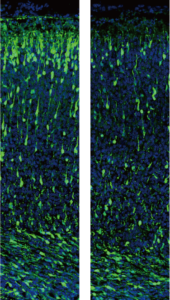Title: Researchers Reveal the Role of the CHAMP1 Gene in Neuronal Development
Body: Intellectual disability affects roughly 2-3% of the world’s population. Scientists understand the genes related to intellectual disability, but how the mutations of these genes cause this developmental disorder remains largely unknown. As a result, effective therapeutic interventions are lacking.
Now, a research group led by two Tohoku University researchers has uncovered the role of CHAMP1—a gene whose mutations are associated with intellectual disability—in neuronal development.
Details of their research were published in the journal Brain Communications on August 30, 2022.
Kozo Tanaka from the Institute of Development, Aging and Cancer, and Noriko Osumi from the Graduate School of Medicine and their group studied mice with the CHAMP1 gene ‘knocked out,’ where one or both of the genes from father and mother were inactivated.
When both of the CHAMP1 genes were deleted, mice died soon after birth. And despite no apparent brain structure abnormalities, the researchers found that neural cell migration towards the brain surface was delayed, indicating a delay in neuronal development.
When a single CHAMP1 gene was lost, mice demonstrated slight memory defects, impaired social skills, and depression-like behavior. These mild behavioral problems resembled some aspects of individuals with CHAMP1 mutations.
Whilst many genes are related to intellectual disability, CHAMP1 is one of the most commonly unearthed mutations, with more that 100 cases worldwide.
“We need further research of CHAMP1 so we can understand how intellectual disability occurs, and to ultimately find a way to treat it,” said Tanaka.
Publication Details:
Title: Deficiency of CHAMP1, a gene related to intellectual disability, causes impaired neuronal development and a mild behavioral phenotype
Authors: Masayoshi Nagai, Kenji Iemura, Takako Kikkawa, Sharmin Naher, Satoko Hattori, Hideo Hagihara, Koh-ichi Nagata, Hayato Anzawa, Risa Kugisaki, Hideki Wanibuchi, Takaya Abe, Kenichi Inoue, Kengo Kinoshita, Tsuyoshi Miyakawa, Noriko Osumi, Kozo Tanaka
Journal: Brain Communications
DOI: 10.1093/braincomms/fcac220
Embargo date: 2022/8/30
Contact:
Name: Kozo Tanaka
Affiliation: Institute of Development, Aging and Cancer, Tohoku Univeristy
Email: kozo.tanaka.d2@tohoku.ac.jp
Faculty / Research Center / Lab website URL:
http://www2.idac.tohoku.ac.jp/dep/molonc/pg40.html
Image:
[Image1]
Caption: Immunofluorescence images of fetal mice brain sections show a delay in the migration of neural cells (green) towards the surface of the cerebral cortex (upper) when expression of CHAMP1 is suppressed (right) compared with a normal condition (left).
License: CC BY
Credit: Nagai et al
Restriction: Reporters may use freely these materials in news coverage with appropriate credit information.
Collaborating institutions:
Did an organization fund this?
JSPS KAKENHI (24370078, 19K22410)
MEXT KAKENHI (26116501, 16H01296, 16H06276 (AdAMS))
MEXT Grant-in-Aid for Scientific Research on Innovative Areas (16H06530)
Grant-in-Aid for JSPS Research Fellow (17J02608)
Grant Program Research from the Division for International Advanced Research and Education, Tohoku University
Grant-in-Aid for Joint Research by Young Researchers, Tohoku University Graduate School of Medicine
Ensemble Grants for Early Career Researchers, Tohoku University
Takeda Science Foundation
Princess Takamatsu Cancer Research Fund (10-24210)
☒ Alert funders when press release is accepted to EurekAlert
Keywords :
gen, disease, mouse, brain
Primary keyword:
Biology


